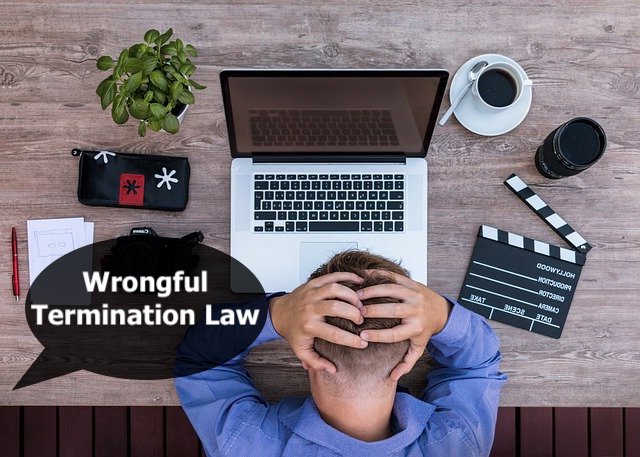LOS ANGELES WRONGFUL TERMINATION ATTORNEY NEAR ME
Los Angeles Wrongful Termination Attorney Near Me is a professional team in Tustin serving all Los Angeles area, There are many Los Angeles Wrongful Termination Attorney Near Me at firms that represent employees against their employers but many of them do not offer free of-charge consultations like SCMC Law Office does. Unlawful Termination is an unfortunate yet frequent occurrence in today’s workforce. Termination becomes wrongful when an employee is fired for an illegal reason. An illegal reason for firing someone would be if they were fired because they belonged to a protected class. Classes that are protected are gender, race, age, religion, ethnicity, sexual orientation, pregnancy, ancestry, disability, marital status, medical condition, color, family and or medical leave, genetic characteristics, pregnancy, genetic information, ancestry, and national origin.
In California, there are many types of reasons for termination that would be considered as “Unlawful or Wrongful” under state law, which would require a Los Angeles Wrongful Termination Attorney Near Me. Reasons that are considered to be illegal for termination would be race, age, disability, sexual orientation, religion, medical condition, marital status, color, ancestry, and engagement in a protected activity. Situations that involve termination based on one of the reasons listed previously would need to be reviewed by an attorney who practices employment law. By having an employment attorney review the details of the termination, they may be able to reach the conclusion of whether or not it is worth perusing and or if it was indeed an unlawful termination, to begin with.
LOS ANGELES WRONGFUL TERMINATION ATTORNEY NEAR ME
Other common forms of wrongful termination are based on pregnancy leave, FMLA, a complaint pertaining to wage violations, complaining about sexual harassment, medical leaves, and requests for reasonable accommodation for a medical condition or disability. Many of these reasons for termination fall along the lines of retaliation. Retaliation would be if an employee complained about an illegal issue such as sexual harassment or discrimination and were soon after terminated. The time frame, as well as the complaint itself, can lead to supporting evidence of a legitimate retaliation claim against the employer by the employee. Other issues can stem from retaliation, ultimately leading up to a forced resignation. Possibly an employee may be threatened to resign or they would be fired. Also, an employer may make an employee’s work environment so unbearable that they have no choice but to quit which may be categorized as harassment as well as retaliation.
A wrongful termination claim is on the termination being in violation of public policy. The public policy must be 1) based on a constitution or statute, 2) intended to benefit the public, 3) established at the time of the termination, and or 4) substantial and fundamental. Determining whether the reason for an employee’s termination actually violated public policy is complex and should be done in a consultation with licensed Los Angeles Wrongful Termination Attorney Near Me. We are experienced and we specialize in employment law, which will benefit your case more so than general lawyers.
Another consideration in determining the legitimacy of the termination claim is causation – this is something that your Los Angeles Wrongful Termination Attorney Near Me will help you with. Can the employee prove that the termination was motivated by a wrongful or malicious intent that violates the employee’s right (unlawful termination)? Let’s assume an employee reports that he or she was sexually harassed by her superior. If she is terminated after reporting this then she would have both a Fair Employment and Housing Act (FEHA) claim and an unlawful termination claim that is valid. To win the claim she must prove she was terminated because she had reported the sexual harassment incident. Of course, her employer could argue that they had terminated her for another reason, such as insubordination, subpar work performance, etc. If this were the case a Los Angeles Wrongful Termination Attorney Near Me could help you!
Proving what the actual reason for the termination was would require evidence on both sides, the employer, and the employee, so it is absolutely essential to hire someone experienced with employment law like us, your Los Angeles Wrongful Termination Attorney Near Me. It would be important to interview witnesses and obtain documents that would support your claim that the employer terminated you in violation of the employee’s rights. Identifying the witnesses and evidence that will support the unlawful termination claim is best done in a consultation with a licensed unlawful termination lawyers orange county who has experience proving unlawful termination claims at trial.
Can I record my boss sexually harassing me?
The legality of recording conversations can vary depending on your location and the circumstances of the recording. In some jurisdictions, recording a conversation without the consent of all parties involved can be illegal, and in other jurisdictions, only one party needs to give consent. Therefore, it is important to research the laws in your jurisdiction before recording any conversations.
In addition, you should consider the potential consequences of recording a conversation with your boss. If you plan to use the recording as evidence of sexual harassment, it may be admissible in court, but there is no guarantee. Additionally, your employer may have policies in place prohibiting employees from recording conversations in the workplace.
Before recording any conversation, you may want to consult with a lawyer or a human resources representative to discuss your options and the potential risks involved. It is also important to consider your own safety and well-being in this situation.
Call NOW toll free at (800) 738-3353 for a FREE CONSULTATION with NO RECOVERY – NO FEE (No Up-front Costs, Fees or Charges) if you feel like your rights may have been violated. Contact via email
Toll-Free (800) 738-3353
Monday – Friday 9:00am to 5:00pm
Wrongful Termination in the US vs the UK
According to the Chron. com article by Gary White, 19 strikes took place in the U.S. in 2012. These strikes involved more than 1,000 workers and caused 148,000 workers to miss at most one day of work. Contrary to this, 29,000 days of production were lost due to work stoppages that occurred on March 11. Due to its wrongful discrimination laws, the U.S. might have fewer problems than the UK in this area. It may also be more advanced than other countries. Even more important, other factors can contribute to this discrepancy.
According to the article, there is no need for an employment contract in the U.S. Importantly, even if an employee feels that he or she is wrong, it does not automatically mean that he or she can sue for wrongful termination in the U.S. An employee in the UK, however, can only claim wrongful termination if he or she is unable to fulfill a contract. According to nola.com’s article “Wrongful termination: Was your firing illegal?” there are instances when company policies violate federal or state mandates, making a case for wrongful termination more evident. This includes the requirement to be absent from work, to serve on a jury, or to report illegal business conduct. If a written or implied agreement was made or it can be proven that there was a clear breach of good faith, the case will likely go in favor of the employees. However, it is more difficult for employees to prove wrongful termination because most Americans are “at-will”, and there are statutes of limitations.
The UK isn’t the only country that has “looser standards” in wrongful termination cases. According to the globalworkplaceinsider.com article, “Wrongful, Unreasonable and Unlawful Dismissals in Hong Kong” by Marie Kwok, there is a litany of reasons an employee can use as grounds for wrongful termination. Employers cannot fire employees, unless they have signed employment contracts, if the employee is pregnant, on sick leave, or because of activity in a trade union. A case in favor of pregnant employees may be easier to obtain internationally than in the U.S. Rubin Tomlin’s article “Top 10 Employment Law Cases – International Women’s Day Edition” on lexology.com states that Brooks vs. Canada Safeway Ltd. was a case in which the Candian Supreme Court found that pregnancy discrimination is the same as sex discrimination. There are loopholes in the U.S. laws that prohibit firing pregnant employees, but they do have some provisions. The Pregnancy Discrimination Act of 1986 prohibits employers from degrading, refusing to hire, or firing pregnant women. However, it doesn’t say that they can’t be treated as regular employees. Vivian Giang’s businessinsider.com article “Here’s How Employers Can Get Away with Firing Pregnant women” states that pregnant women can get fired if they are required to lift a 70-pound container. These rules are much more common internationally than they are in America.
The difficulties involved in successfully suing for wrongful termination seem to do more harm than good for average employees. However, this fact could be having a reverse effect. According to thestreet.com article “Labor Strikes on the Decline”, by Seth Fiegerman the average number of strikes involving more than 1,000 people has fallen to 20. This is a decrease from 80 to 90 strikes in the 1980s and 1990s. This can be attributed to the steady decline of union membership. A third of the workforce belonged to a union in the 1940s. This number had fallen to 12.3% by 2009. These numbers suggest that people don’t worry as much about wrongful terminating suits, or maybe they don’t engage in them as often. Employers, for their part, are reluctant to handle employee lawsuits. This is a good thing. The insurancejounral.com article “What are the Chances that a U.S Business will Face an Employee Lawsuit?” by Andrew Simpson shows that the average company’s defense costs amount to $125,000. One in four cases will result in a judgment exceeding $500,000.
The median judgment for cases that go to trial is $200,000, and the median judgment on all cases is $200,000 This scenario is possible even in the United States, where it is harder to prove wrongful termination. For example, a PG&E employee won a large award in 2012 Mercurynews.com reports that Matthew Niswonger, a PG&E employee, won $1 million in a Santa Cruz lawsuit for wrongful termination. He had been with the company for eight years.
His crew was called to replace an electric pole. This involved working within inches of live wires. Niswonger complained that the work was unsafe. He was fired shortly after that, due to a series of unfortunate events. Niswonger filed suit, citing emotional damages and lost wages. The judge sided with Niswonger and awarded him $595,615 for lost wages and $500,000 for emotional damages. PG&E was also required to pay Niswonger his legal fees. Niswonger was able to prove that his termination was due in large part to the safety complaint. Even though wrongful termination is difficult to prove, employees can win cases. Companies should be aware of this.
The U.S. has stricter wrongful termination policies than other countries. This is not necessarily a negative thing, as has been proven. However, this isn’t the only factor that contributes to lower productivity and strikes. Cost and hassle are also important factors. It turns out that wrongful termination must be seen in all its complexity to allow for an accurate diagnosis.





